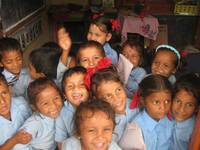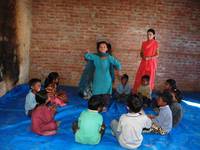Early Childhood Care and Education (ECCE)
Early Childhood Care and Education( ECCE) uses a holistic approach integrating health and nutrition to reach Goal 1 of the EFA Dakar Framework for Action: “ Expanding and improving comprehensive early childhood care and education, especially for the most vulnerable and disadvantaged children.”
The UNESCO Office in Kathmandu supports national efforts in developing an ECCE strategy framework and curriculum and enhancing the capacity of education officials and other key stakeholders at all levels. For example, the office assists government in:
- Reviewing ECCE policy
- Preparing policy briefs
- Developing training materials
Primary Education

©UNESCO/Aliza Shrestha Dhungana
Primary education children
Primary (basic) education is a fundamental human right. UNESCO works with national governments and EFA partners to ensure free and compulsory primary/basic education of a good quality for all by 2015.
In the area of primary education, the UNESCO Office in Kathmandu works, for example, in:
- Developing bridging prospects between formal and non-formal education through equivalency programmes to achieve universal primary education
- Developing and testing equivalency programmes for out-of-school children in primary education through alternative schooling, with a particular focus on disadvantaged groups.
Secondary Education

©UNESCO/Ellen Lange
School girls at the UNESCO book stall
Secondary education aims to help young people to develop their full human potential and ensure their place in society as productive, responsible and democratic citizens. It helps to prepare learners in both formal and non-formal settings for higher education and the world of work.
In Nepal, progress towards achieving Universal Primary Education has led to a growing demand for secondary education. The UNESCO Office in Kathmandu supports the government with the effective implementation of the School Sector Reform Plan (2009-2015), providing support in capacity development towards improving access and retention of students in secondary education.
Higher Education
There is a growing recognition of the role that higher education plays in enabling Nepal to overcome poverty and achieve sustainable development and economic growth. The government‘s focus is on the overall quality enhancement of higher education and scientific research and development.
The UNESCO Office in Kathmandu supports national efforts in developing a comprehensive higher education policy in Nepal.
Inclusive Education

©UNESCO/Mukunda Bogati
Visually impaired students learning computer
Inclusive education is addressing the diverse needs of all learners by reducing barriers to, and within the learning environment. It addresses the learning needs of all children, youth, and adults, with a specific focus on those who are vulnerable to marginalization and exclusion.
The UNESCO Office in Kathmandu supports national efforts to enhance the capacities of teachers and programme implementers, for example through:
- Adapting the Inclusive Education Toolkit to promote the school environment that celebrates diversity and upholds human rights
- Preparing an audio-visual documentary “Hamro (Our) School” on the practices of inclusive education in Nepalese classroom was prepared and disseminated
- Preparing an advocacy kit for promoting multilingual education: Including the excluded is adapted in Nepali, Maithili and Bhojpuri
HIV and AIDS in Education
The UNESCO Office in Kathmandu supports responses to HIV and AIDS that are inclusive and sensitive to the needs and issues of all of the population, but with particular attention to children in the school setting.
Examples of the Office’s action in the area of HIV and AIDS in Education include:
- Preparing HIV and AIDS advocacy kits for community members and head teachers
- Reviewing the education sector response to HIV and AIDS
- Supporting the MoE in developing an education sector strategy and policy on HIV and AIDS
- Reducing the vulnerability of illiterate women to HIV and AIDS through non-formal means of education
Languages in Education
The Office in Kathmandu promotes mother tongue instruction as a means of improving educational quality by building upon the knowledge and experience of learners and teachers.
The Kathmandu Office’s work includes:
- Designing and implementing mother tongue-based literacy programmes
- Developing and disseminating an advocacy kit for promoting multilingual education: including the excluded
- Preparing thematic papers on language issues in a federal structure and organizing informed debates

